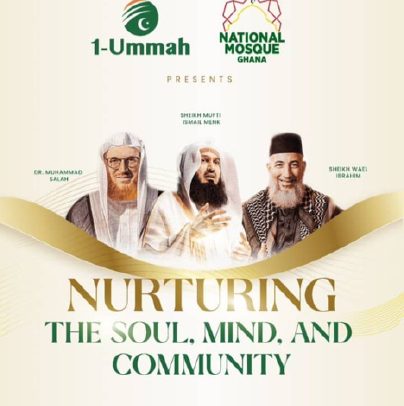International Muslim scholars have advised Ghanaians, especially Muslims, not to allow dissenting views to breed conflict and disagreement among them in adherence to the tenets of God.
The Islamic scholars, who made the call during an interview with the DAILY GUIDE at the International Peace and Unity Conference held at the National Mosque in Accra, said people should not be divided along any lines of interest irrespective of their religious persuasion.
The International Peace and Unity Conference was organised by 1-Ummah Islamic organisation in collaboration with the National Mosque and Jil al quran.
Sheikh Wael Ibrahim, an Islamic scholar, disclosed that division among members of society due to disagreement with one another will destabilise the peace and stability of countries, hence the need for people to appreciate and accept each other in their service to God.
He explained that though there were different ideological beliefs as a result of several factors, including diversity of culture, those beliefs should rather unite them.
Sheikh Mufti Ismail Menk, who is also an Islamic scholar with many years of experience in teaching and mentoring dozens of youth, admonished Ghanaians to continue to coexist as expected from God without holding grudges against one another, especially in a world where each one is blessed with one gift or the other.
He said, “Unity is not uniformity, but rather it is the ability to respect one another in diversity that is unity, so when you respect each other and live with each other, you are united, where everyone needs to think the same, everyone needs to dress the same, everyone needs to believe exactly the same, that’s not achievable. That is impossible on earth.”
He also advised people not to incite or engage in acts that have the tendency to destabilise the nation in the event their preferred candidates fail to win the elections, even if they espoused the best of policies and vision for the country.
Dr. Muhammad Salah, a prominent leading Islamic scholar, in a sermon titled “Importance of Knowledge and Education in Islam,” also advised Muslims, particularly the youth, to be mindful of the type of things they learn in their quest to acquire knowledge given the kind of information they are exposed to in recent times.
Dr. Salah, who is also a lecturer at Al-Azhar University in North America, therefore advised Muslims to verify all information they have in order not to consume or share any form of information that may affect their well being.
The conference, held under the theme, “Nurturing the Soul, Mind and Community,” which began with a public lecture at the National Mosque in Accra, ended with a lecture at the Kwame Nkrumah University of Science and Technology (KNUST) in Kumasi.
By Ebenezer K. Amponsah


